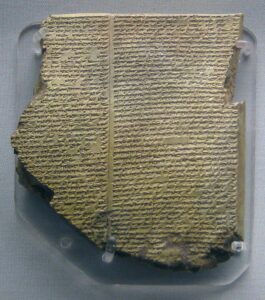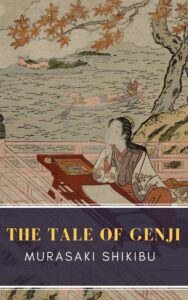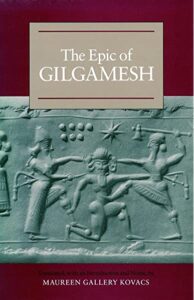
Debbie Burke’s recent post about falling down research rabbit holes has launched a couple of ships this week. Here is mine. I fell through a research wormhole and found myself engrossed in a topic totally different from the one on which I started.
What I ended up digging into is what is (generally) regarded as the first known book and its cousin, the first known novel. It’s a fascinating topic. Folks, including myself, might reflexively answer the question as to what the first known book is with the response (index finger in the air for emphasis) as “The Gutenberg Bible!” It’s not even close. The Gutenberg Bible is the first printed book from moveable type, which a noteworthy accomplishment to be sure. The first known printed book, however, is The Diamond Sutra, which was created in China in the ninth century, using wooden blocks somewhat like you can now find in arts and crafts sections at Michael’s and similar stores (don’t forget the ink pad). That said, even The Diamond Sutra isn’t the first known book.

Since we are moving backward, let’s discuss for a moment what is currently regarded as the first novel. It is titled The Tale of Genji and is considered, with some dispute, to have been written almost one thousand years ago, in the eleventh century, by Lady Murasaki Shikibu. That name is believed to have been a pseudonym, but Lady Murasaki, as she is known to us, was a noblewoman who was invited to be a lady-in-waiting to the Japanese empress Soshi at the Imperial Court. The Tale of Genji is considered to be a psychological and romantic novel. What is remarkable about this is that in the world of Japanese literature at the time genre literature was held in low esteem. Time really is a flat circle, isn’t it? The Tale of Genji was so well-written and popular that it nonetheless influenced Japanese culture and mores and continues to do so in present times. Genji, a courtier, is portrayed as being passionate and gentle, which is part of the appeal of the story. The novel continues to be studied, researched, and translated. The most recent translation that I could find is approximately 1300 pages long. It looks to be somewhat rough sledding to read but it nonetheless endures.

That brings us to what is acknowledged as the first known book, titled The Epic of Gilgamesh. Gilgamesh is, by amazing coincidence, an epic poem believed to have been written in installments between 2100 and 1200 B.C. (what is a millennium between friends?) and is an exaggerated and fictionalized account of the exploits of Bilgamesh, the King of Uruk. It is preserved on cuneiform tablets but you can read it on a Kindle. You should. Its exact author is unknown but whoever it is launched a thousand literary ships. Gilgamesh and Enkidu, Gilgamesh’s enemy turned BFF, cut a wide swath through the known world, drinking, fighting, and ravishing until they take things a step too far. A tragedy leaves Gilgamesh seeking the meaning of life and attempting to acquire immortality, with predictable results.
Or maybe not. Gilgamesh lives on. There is a heck of a story here. You can find traces of it in Don Quixote, Fritz Leiber’s Fafhrd and Gray Mouser stories, Robert Lee Howard’s Conan tales, and yes, the tales of Roland in Stephen King’s The Dark Tower series. Oh, and did I forget The Iliad, The Odyssey, and the Aeneid? There may be a book that is the source for The Epic of Gilgamesh, buried in spider doo-doo somewhere in the Middle East, but it hasn’t been found yet. So why isn’t it regarded as the earliest novel? It’s a poem, for one, For another, it’s only a hair or so over one hundred pages, which I guess qualifies it as a novella. It is in any event worth reading, in translation, of course.
Gilgamesh may not have physically lived forever, but he certainly has in the literary sense. I doubt the author(s) ever imagined that their epic poems would be read and revered thousands of years after being written but there you go. My best advice to you, my friends, is to dust off that trunk novel and give it another shot. Someone may be reading you at some point in the future and considering you the best of your time. Why not you?
Now, a question for you. Has there been any story/poem/novel from the time period which we have been discussing (a long one to be sure) that has influenced you, or that you still return to for inspiration, succor, or reference, for any reason, including but not limited to writing?

Beowulf. Definitely Beowulf.
Four thumbs up for Beowulf, Harvey. Thanks!
Joe, I was still a bit sleepy when your post appeared this a.m. and I misread the title as “Achieving Immorality Through Fiction.” What a disappointment to find instead a scholarly study on ancient literature!
Kidding aside, thanks for a great summary of early books as well as your kind shout out.
You’re welcome, Debbie. And thanks again for your great post.
I will confess that my first time through I accidentally typed “Immorality” instead of “Immortality.” One is a lot easier to achieve than the other.
Great post, Joe. Very interesting.
But as to your question, I have not read widely enough in recent or classic fiction, let alone ancient story/poem/novel. The oldest book I’ve read–and it is story and poem, with a theme running through it–is the Bible. I’ve read it multiple times. It continues to influence my life, and I use verses from it for an epigraph in my books.
As for that immortality through fiction, should we start buying those wooden blocks to print with, or better, learn to write on clay tablets? Maybe I’ll start looking for a cave with nice clean large walls.
Have a great weekend!
Thank you, Steve. You might be interested in knowing that The Epic of Gilgamesh mentions The Great Flood.
I was going to suggest that you use something other than clay tablets for your writing but then realized that it worked pretty well for Moses, even if he did throw them in anger. Of course, I’ve been known to (almost) throw a computer or two across the room. Some things never change.
Please have a great weekend as well!
Excellent post, Joe. I once used Ovid’s Metamorphosis (8 AD) for one of my books. Many scholars still study Ovid’s magnum opus today, and their findings are fascinating.
Thank you, Sue. That’s a pretty ambitious starting point for a novel, certainly one beyond my intellectual grasp. These days, however, most things are. Thanks for sharing!
Sophocles, esp. Antigone. Speaking truth to power, baby. And anticipating cancel culture. To Creon she says, “All here would own that they thought it well [to bury my brother], were not their lips sealed by fear.”
Thanks, Jim. It’s funny that you mention ancient lit anticipating present-day problems. Although Han Christian Andersen doesn’t meet the definition of “ancient” I was reading “The Emperor’s New Clothes” the other night and was amazed at how much of it is applicable today, particularly with regard to how people deny what is right in front of them in an attempt to feel “smart.” The Grimms get all the props but Andersen endures.
Happy Saturday, Joe! Fascinating post. The Epic of Gilgamesh is the oldest work I’ve read. I gobbled up the great Fritz Leiber’s Fafhrd and the Gray Mouser novels after the Dungeon and Dragons roleplaying group I joined in August 1977 highly recommended I check them out. Robert E. Howard’s Conan stories also. Before then, I’d been a big science fiction and thriller reader, but fantasy hadn’t caught fire. Jack Vance’s Dying Earth and Karl Edward Wagner’s Kane novels etc followed.
I read the Epic of Gilgamesh while I was in college. I was a history major, specializing in East Asia, and read the 14th century Chinese novel The Romance of the Three Kingdoms, and the Japanese work The Tale of the Heike. Both are about the falls of Imperial dynasties, Heike dealing with the end of the world that the Tale of Genji is set in, the Heian.
BTW, there’s an gripping 2001 Japanese fantasy film, Onmyoji, set during the Heian period, about a court sorcerer and his nobleman ally, who have to get to the bottom of demonic intrigue that that threatens the Emperor and those around him. Some great mystery elements. There’s also a sequel. Both movies are based on a novel series of the same name.
Thanks for a wonderful post that brought back some great memories! Have a wonderful weekend.
Happy Saturday to you as well, Dale, and thank you for the film recommendation. I have the feeling that you and I haunted the same corners of the bookstores back in the day, separated by a decade or so but still. I wish I could recapture the wonder of cracking the binding of some of those books for the first time…
I gotta admit I’m not schooled on the classics and the ancients, Joe, so I found this post very interesting – enlightening, you might say. You asked about influences from past works, and immediately Mark Twain’s Tom Sawyer and Huck Finn popped into my little mind. To me, they were pure stories of freedom and high jinx. Fun, yet strong social statements with forward thinking. But now, to some of the social warriors and politically correct, self-appointed, elite doufusses we have up here in left-leaning British Columbia, Twain’s works are said to be so highly offensive with ethnic slurs that the movement’s on to have them banned from public schools. Kid you not.
Garry, I cut my teeth on those Mark Twain books and I totally agree. We have the same problem here in the lower 48 that you described. Jim is the smartest character in those books, a fact which seems lost upon the anointed. By the way, the usual suspects are now going after Dr. Suess. I wish I was kidding and that you were too, but we’re not. Thanks for stopping by.
When I lived in a colder climate, I found inspiration in a much newer work — it’s medieval — ” Sumer is icumen in” — it was a good way to herald the warm weather.
I totally agree, Elaine. Optimism gets one through the coldest times. Thanks for bringing in some sunshine here.
I was lucky enough to see some of the early Japanese books when I was visiting one of the Harvard libraries with a friend who was doing her dissertation on Thomas Wolf and was allowed access to his papers. I missed a Shakespeare FOLIO display by two days. One of the greatest historical losses in my life.
So, I’d say Shakespeare because, dang, that guy could write and tell stories that will not go away. I imagine the only author as copied and influental is Conan Doyle. I have called STAR-CROSSED “Romeo and Juliet in Spaaaaace” (MUPPET SHOW reference) because it was, and I had a lot of fun with equating my characters, etc., with the play. THE TEMPEST and a poem by TS Eliot became structural and metaphorical references for one of my published novel.
You can take the girl out of the graduate school and college teaching career, but you can’t unstuff her brain from all those classics.
I can’t disagree with Shakespeare either, Marilynn, and you can’t unlearn what you know. Thanks for the reminder.
Wasn’t an English/Literature/Writing student, so never got into the time frame of this post. Did see the Book of Kells in Ireland. I agree with Garry about Twain, especially Huck Finn.
Terry, getting to see the Book of Kells must have been a transformative experience. I think of the work — truly a labor of love and faith — that went into something like that and it boggles my minds. Thanks for sharing.
To be totally honest, here, Joe, it was the library upstairs that was, for me, the highlight of that site. If I can ever figure out how to get photos into comments, I’ll share.
You mean I’m not the only one who doesn’t know how to do that?
I absolutely love studying history. And have embarked on not one, but two historical thriller series as my WIPs. One set in Medieval Europe and one set before the flood of Noah’s day. Both have me delightedly running down multiple rabbit holes, gopher holes, pigeon holes, tiny little ant colonies in their plastic cases.
The Bible, particularly the books of Genesis and Job, are the two primary resources for the first, while I am also reading/rereading a whole slew of historical and mythological sources from Sumerian, Akkadian, Egyptian, Chinese, Vedic, Nordic, Celtic and so on. The Enūma Eliš is one, telling the origin of Akkadian pantheon and the god Marduk. Gilgamesh of course as well.
I presently live, eat, work, sleep, dream in ancient cuneiform.
Wishing I had not lost my card for the Alexandrian Library.
Wow, Basil. All that and you are a fine fellow as well! Amazing. Thanks for sharing.
Regarding that lost library card…you can probably get a forged one. Who is going to challenge it?
My Sumerian Chronicles series predates Gilgamesh by a millennium or so, but springs from my fascination with Sumerian history, which spans two millennia plus. So, coming in late here, Joe, but thank you for writing about the period that got me started in fiction.
Interesting to note that the first Sumerian poet was a woman, Enheduanna, who produced a number of what we might call today “odes” celebrating one king or another, plus hymns to goddess Inanna.
We often think of people living B.C. as primitives, but if you get the chance to read these works, you’ll realize that the written word has expressed the human experience for thousands of years. We’ve had creatives all along, it’s just in the last few hundred years that writing has proliferated those expressions.
Here’s another thought. Your picture at the top of the article is a piece of clay that has survived 4,000 years. What will become of our digital prose? Will it find a medium as durable as stone or fired clay?
How many of us own a device today that could play back a vinyl tape recording from even as recent as 1970?
Imagine an archaeologist 1,000 years in the future coming across a 2021 iPhone loaded with a personal library of fiction and nonfiction. Will she be able to capture what’s etched in silica wafers the size of her pinky fingernail?
You’re welcome, Dan, and you’re not late because here at TKZ we never close. Thanks for raising all of those interesting questions pointing out how the planned obsolescence of today’s technology may render much of what we have lost to future generations. I did some research and found that one can still buy cassette players and can do so fairly inexpensively. Radio Shack, amazingly, still sells them. I say “amazingly” because I thought Radio Shack was out of business. It is not.
When I was initially reading your comments my granddaughter came into the room, picked up a new book that was on the table, opened it, brought it close to her face and inhaled deeply. That says it all. You can’t do that with a Kindle or a CD, can you?
As a college freshman, I had the good fortune to take a course in The Iliad and the Odyssey taught by a gifted professor. I was especially captivated by The Iliad. There was rage, epic war, manipulation, and egos that would make our current politicians look like amateurs. In the midst of all the brutality, I remember the tender scene of Hector taking his flashy, feathered helmet off because it frightened his infant son. Amazing.
“Sing, goddess, the anger of Peleus’ son Achilles.”
Kay, I agree, that’s great fortune indeed. Those stories are still stirring after all these many centuries, particularly the scene you described. Thanks for the reminder.
Joe, you and Debbie really made me chuckle with the banter about Immorality vs Immortality.
I’ve skimmed a lot of weird stuff in various research for the reenactment group I enjoy as a hobby: poems, novels, war records, cargo manifests (mainly looking for name, clothing, and food references.) but I haven’t read a full “classic” since college!
For pure enjoyment, I return time & again to Rumi, that ancient (well, 13th C) Persian poet with the sublime turn of phrase.
Thanks for the recommendation regarding Rumi, Cyn! As far as ancient goes, my children regard anything occurring before 1960 as ancient. My own definition has, um, evolved over time.
“Has there been any story/poem/novel from the time period that you still return to for any reason, including but not limited to writing?”
My goodness: Aside from all the greats mentioned above, Snorri Sturluson’s ‘Edda’.
What a fantastic article! Thank you for the in-depth look at your research, it bears out one of my favorite quotes from Carl Sagan: “Books break the shackles of time.”
On that note, it’s amusing to think that a thousand years from now, someone will be doing scholarly dissertations of Fifty Shades of Gray. They’ll note how it perfectly encapsulated the obsessions of western culture at the time, and inspired the basis of their futuristic interstellar civilization…
Sparks, thank you so much for your kind words and comments as well as for your recommendation of the work of Snorri Sturluson, who had a very rough death for an author.
I take your point about Fifty Shades of Gray but I don’t think that it will take a thousand years for those dissertations to happen. It only took a half-century for Yoko Ono’s recordings to somehow be compared favorably with the best work of The Beatles. Excuse me while I go rend my garments. Thanks again, Sparks!